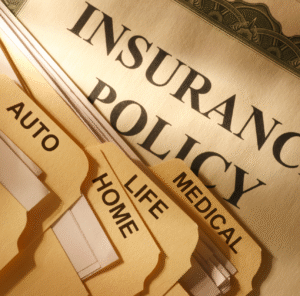Remember Your First Line of Defense: Insurance
The modern insurance market dates to seventeenth-century London, where merchants reeling from the Great Fire of London started pooling funds to cover fire losses. Today, this same basic concept—pooling risk to protect individuals and businesses from catastrophic loss—underpins nearly every sector of the global economy. The US insurance market, the largest in the world, is worth an estimated $1.7 trillion and underwrites risks that could otherwise devastate individuals, homes, and businesses.[1]
Recent shifts in the insurance market have led to many people paying more and getting less from their insurance policies. However, amid these frustrations, it is important to remember that insurance remains your first defense for protecting your wealth and legacy.
Homeowner’s Insurance: Protecting Your Biggest Asset
According to a recent study from ValuePenguin, two-thirds of homeowners say their rates went up in 2024, and 25 percent received nonrenewal notices.[2] Half of homeowners worry that their homes will become uninsurable, and almost a quarter of policyholders are questioning whether home insurance is even worth the expense[3] as customer satisfaction with homeowners insurance reached a seven-year low in 2024.[4] Although these numbers sound discouraging, going without homeowner’s insurance, or not having enough insurance, could be an unrecoverable mistake. For most Americans, their home is their largest asset. If you own a home, you need to review your policy limits, explore bundling options, compare quotes for optimal value and protection, and update coverage to match rising rebuild costs.
- What it typically covers: Home insurance typically covers repairs or rebuilding after fires, storms, vandalism, or theft; personal property (furniture, electronics); liability for injuries on your property; and temporary living expenses if you are displaced. Floods and earthquakes require separate policies.
- How much coverage you need: You need enough to rebuild at today’s costs, which are up significantly. You will also need personal property coverage and liability coverage. You will likely need a policy rider if you have high-value items (jewelry, art, etc.).
- How homeowner’s insurance impacts your estate plan: Because your home may be one of your most valuable things, it is important to protect it. As premiums rise, you may be tempted to reduce coverage, but doing so could jeopardize what you leave behind for your loved ones.
Renter’s Insurance: Affordable Protection for Your Belongings
Renting is increasingly more affordable than buying a home. Nationally, the average mortgage payment costs 38 percent more per month than the average rent.[5] Many people, including a growing share of wealthy Americans, are choosing to rent rather than buy in the current market.[6] Renter’s insurance is highly affordable, costing around $15 to $25 monthly, but only 37 percent of renters have it.[7]
- What it typically covers: Renter’s insurance typically covers personal property (electronics, clothing, furniture) against theft, fire, or water damage; liability within the rented space; and temporary living expenses if you are displaced. Jewelry, collectibles, and other high-value items are often capped without riders. Standard renter’s insurance policies may have limitations or exclusions regarding at-home business-related activities, necessitating a separate business insurance policy.
- How much coverage you need: To determine how much coverage you need, estimate your belongings’ value and replacement cost. Creating a photo inventory of your items can be helpful. You should also include liability coverage, which can be used for expenses such as medical bills, legal fees, or damages. High-value items such as laptops and bicycles may require extra coverage.
- How renter’s insurance impacts your estate plan: Even if you do not own a home but rent instead, you probably have stuff worth protecting. Personal property, from heirlooms to technology, can comprise a large part of what you own.
Do not assume that your landlord’s policy will cover you or your possessions. Finances might be tight, but skimping on insurance could be costlier: the average claim for loss due to theft and burglary is approximately $3,000,[8] about 20 times higher than the average annual premium.[9] And if the law where you live does not require renter’s insurance, your landlord might.
Car Insurance: Your Roadside Safeguard
Every state except New Hampshire mandates car insurance. Premiums jumped 7.5 percent in 2025, on top of a 16.5 percent increase in 2024.[10] Higher rates mean that more drivers are choosing to drive uninsured, leading to higher risks and premiums for everyone.[11]
- What it typically covers: Car insurance typically covers liability for injuries and property damage you cause; collision insurance covers accident repairs; comprehensive insurance covers theft, vandalism, or flood damage; and medical coverage pays for injuries. Uninsured motorist coverage may protect against hit-and-runs, and underinsured motorist coverage may kick in when the at-fault driver’s insurance is insufficient to cover your losses.
- How much coverage you need: Beyond state minimums, it is important to have adequate coverage for liability, comprehensive, collision, and medical payments.
- How car insurance impacts your estate plan: Whether gifted or sold, vehicles can be valuable items. Some may be worth even more than real estate. Adequate car insurance can protect the value of what you leave behind from liability claims arising from accidents that occur before your affairs have been wound up. Potential lawsuits can deplete the money and property intended for your beneficiaries. Your estate’s personal representatives, executors, and successor trustees should act quickly to confirm coverage and discuss how to maintain protection during administration.
Umbrella Policy: Your Extra Layer of Protection
Umbrella policies can offer around $1 million in added protection for about $200 annually.[12] In an increasingly litigious society, the risk of facing a substantial lawsuit should not be underestimated. Verdicts in personal injury lawsuits can easily exceed standard homeowner’s, renter’s, or auto insurance limits.
- What it typically covers: An umbrella policy covers extra liability beyond home, auto, or renter’s policies, including lawsuits from accidents, property damage, or defamation. It kicks in after primary insurance limits have been exhausted.
- How much coverage you need: The amount of coverage you need will be based on the reason you need the umbrella policy. Some advisors believe that your umbrella policy coverage should at least match your net worth.[13] However, this calculation should also consider your other insurance, home equity, and retirement savings. Working with an insurance agent is the best way to ensure that you are adequately protected.
- How an umbrella policy impacts your estate plan: An umbrella policy protects your accumulated hard-earned money from unforeseen legal liabilities, helping to ensure that more of your money and property will be preserved and passed on to future generations.
An umbrella policy may seem like an unnecessary added expense at a time when your regular insurance policies are already going up in price, but it is a relatively low-cost hedge against a large liability claim that could wreak havoc on your finances and estate plan. Umbrella policies can be particularly valuable for those with significant assets or multiple properties; landlords of rental properties; or people with high-risk lifestyles (e.g., pet owners or event hosts); as well as professionals, such as doctors, who face litigation risks.
Business Insurance: Safeguarding Your Livelihood
Research shows that 75 percent of small businesses are underinsured,[14] leaving them vulnerable to risks such as property damage, lawsuits, and cyberattacks, which increasingly target small businesses. Commercial clients also face higher premiums and tougher underwriting across general liability, property, and cyber policies, often with new exclusions and longer claim processing times.
- What it typically covers: Business insurance includes general liability for customer injuries and property damage; property insurance for buildings and equipment; professional liability for service errors; business interruption for lost income; and cyber insurance for data breaches. Also, workers’ compensation is required for employees.
- How much coverage you need: This amount depends on several factors, including the type of coverage you need (business owner’s policy, general liability insurance, workers’ compensation insurance, and professional liability insurance); the type of industry you are in; your organization’s size; the number of employees you have; general industry risk; and your business’s location.[15] Also, keep in mind that home-based business owners who rent might need business insurance.
- How business insurance impacts your estate plan: Insurance can play a key role in your estate plan and succession planning, helping preserve the business’s value against losses and protect your loved ones’ financial interests.
Ensure That You Are Properly Insured
Insurance can be overlooked until it is needed most. Instead of viewing insurance purely as a cost, try to reframe it as an investment—not necessarily in the traditional “market return” sense, but as one that manages risks and supports your long-term financial and estate planning goals.
Despite all its flaws, insurance is the foundation of our modern economy and your personal wealth. It enables homeownership by backing mortgages, fuels business growth by mitigating risks, and protects your estate from disasters or lawsuits.
Today, the typical American faces more-complex and higher-stakes risks, making thoughtful, tailored insurance coverage a must. To explore ways to navigate the challenging insurance market, reach out and schedule a time to talk.
[1] Marcus Lu, Visualizing America’s $1.7 Trillion Insurance Industry, Visual Capitalist (Jan. 13, 2025), https://www.visualcapitalist.com/visualizing-americas-1-7-trillion-insurance-industry.
[2] Sarah Fisher, Half of Home Insurance Policyholders Worry Their Homes Will Become Uninsurable, ValuePenguin (Mar. 31, 2025), https://www.valuepenguin.com/uninsurable-worries-survey.
[3] Id.
[4] Customer Satisfaction with Homeowners Insurance Property Claims Declines to 7-Year Low Amid Record Catastrophic Events and Slower-Than-Ever Repair Times, J.D. Power Finds, J.D. Power (Mar. 19, 2024), https://www.jdpower.com/business/press-releases/2024-us-property-claims-satisfaction-study.
[5] Alex Gailey, Study: Renting is increasingly more affordable than buying in most large U.S. metros, Bankrate (Apr. 23, 2025), https://www.bankrate.com/real-estate/rent-vs-buy-affordability-study.
[6] Lisa Riley Roche, Is renting rather than buying housing becoming more attractive to the wealthy? What a new analysis says, Deseret News (Mar. 11, 2025), https://www.deseret.com/utah/2025/03/11/are-more-wealthy-american-renting-rather-than-buying-a-home-what-a-new-analysis-found.
[7] Renting Statistics, The Zebra (Nov. 18, 2024), https://www.thezebra.com/resources/research/renting-statistics.
[8] Jessica Humeck, Renters Insurance Claims, Trusted Choice (Mar. 2, 2020), https://www.trustedchoice.com/renters-insurance/coverage-claims.
[9] Sarah Schlichter, The Average Renters Insurance Cost, Nerdwallet (Jan. 2, 2024), https://www.nerdwallet.com/article/insurance/how-much-is-renters-insurance.
[10] 2025 State of Auto Insurance: Rate Increases Are Slowing Down in 2025, PRNewswire (Jan. 7, 2025), https://www.prnewswire.com/news-releases/2025-state-of-auto-insurance-rate-increases-are-slowing-down-in-2025-302344613.html.
[11] Lonalyn Cueto, Rising number of uninsured drivers increases auto insurance costs, report warns, InsuranceBusiness (Mar. 28, 2025), https://www.insurancebusinessmag.com/us/news/auto-motor/rising-number-of-uninsured-drivers-increases-auto-insurance-costs-report-warns-530170.aspx.
[12] Sarah Schlichter, What Is Umbrella Insurance, and How Does It Work?, Nerdwallet (Jan. 2, 2025) https://www.nerdwallet.com/article/insurance/umbrella-insurance.
[13] How Much Umbrella Insurance Do I Need? Ramsey (May 1, 2025) https://www.ramseysolutions.com/insurance/how-much-umbrella-insurance-do-I-need.
[14] 75% of Small Businesses Are Underinsured, Says Hiscox Survey, Ins. J. (Oct. 11, 2023), https://www.insurancejournal.com/news/national/2023/10/11/743586.htm.
[15] How Much Does Small Business Insurance Cost?, The Hartford (Apr. 9, 2025), https://www.thehartford.com/business-insurance/how-much-business-insurance-cost.

